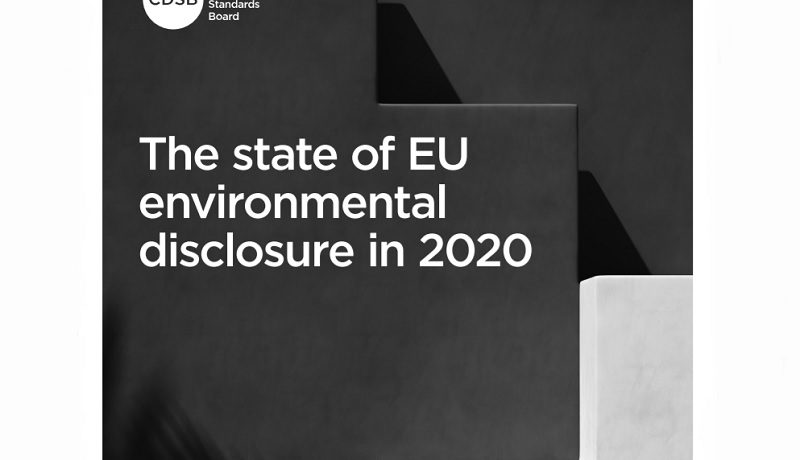Corporate Environmental Disclosures. CDSB calls for regulatory change following review of European Corporate Environmental Disclosures. The third consecutive review of environmental and climate-related disclosures in Europe shows signs of improvement, but the information remains insufficient for investment decision-making.
Latest report released by the Climate Disclosure Standards Board “The state of EU environmental disclosures in 2020” analysed the strength and weaknesses of disclosure among 50 largest companies in the European Union with a combined market capitalisation of US$3.5 trillion under the EU Non-Financial Reporting Directive (NFRD).
Companies reviewed showed progress in the completeness and quality of greenhouse gas emissions and business model disclosures, however the top strengths and weaknesses remain unchanged.
CDSB’s report concludes that investors’ ability to integrate information disclosed under the EU’s rules into their decision-making is inherently limited without further improvements to the Non-Financial Reporting Directive on TCFD, risk and materiality.
Top strengths:
– Policies and due diligence – All companies disclosed environmental policies, but 30% did not clarify board and management level due diligence;
– Business model – 52% fully disclose the environmental aspects of their business model; and
– Key performance indicators – All companies provided GHG emissions disclosures, but only 10% disclosed metrics on biodiversity.
Top weaknesses:
– TCFD – 68% referenced the recommendations of the Task Force on Climate-related Financial Disclosures, but only 18% adequately disclosed their resilience to different climate scenarios;
– Principal Risks – 74% considered both physical and transition risks, but just 4% clearly disclosed risks over different time horizons; and
– Materiality – 38% (2019: 8%) applied a double materiality perspective, but this did not necessarily improve the quality of disclosures.
In her keynote address at the launch event, EU Commissioner Mairead McGuinness said: “The rules of the game must be transformed to fully integrate sustainability at every step of the financial value chain, and that’s why the Commission has prepared the Renewed Sustainable Finance Strategy for early next year. One of the priorities of the renewed strategy will be to strengthen the foundation for sustainable investment and the review of the Non-Financial Reporting Directive is crucial.” “Our ultimate aim,” she added, “is to put financial and the so-called non-financial information on the same footing.”
Mardi McBrien, CDSB Managing Director, said: “To achieve the goals of the Paris Agreement, it is essential for investors to receive comparable and consistent information that is needed to inform their capital allocation. The sustainability reporting landscape is moving towards harmonisation and common standards. The work of the European Commission is important in achieving this goal and we will continue working closely with Europe to develop leading approaches and internationally to develop a global baseline that works for all.”
The Climate Disclosure Standards Board (CDSB) was founded in 2007 and is an international consortium of business and environmental NGOs committed to advancing and aligning the global mainstream corporate reporting model to equate natural capital with financial capital. It does so by offering companies a framework for reporting environmental and climate information with the same rigour as financial information.
In turn, this helps them to provide investors with decision-useful environmental and climate information via the mainstream corporate report, enhancing the efficient allocation of capital.
Regulators also benefit from compliance-ready materials. Collectively, we aim to contribute to more sustainable economic, social, and environmental system.
CDSB also hosts the TCFD Knowledge Hub on behalf of the Task Force on Climate-related Financial Disclosures.

